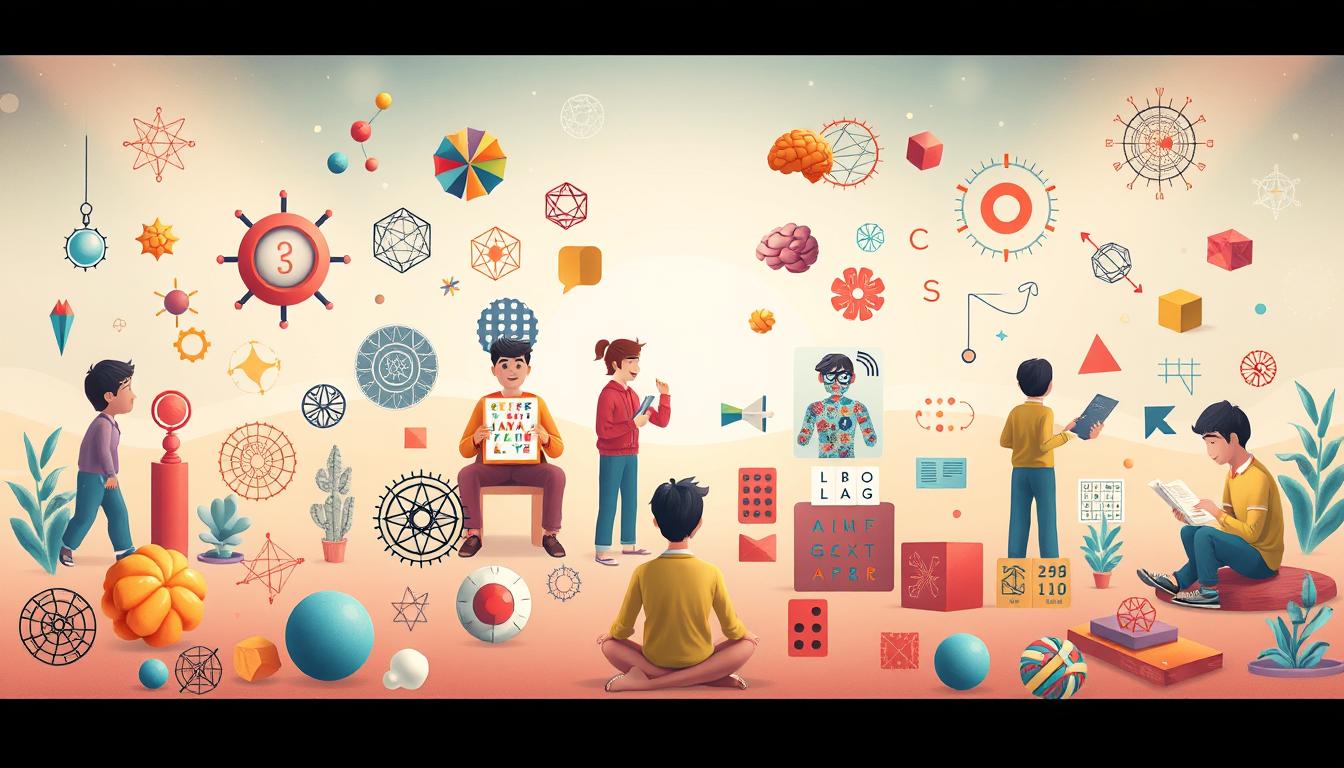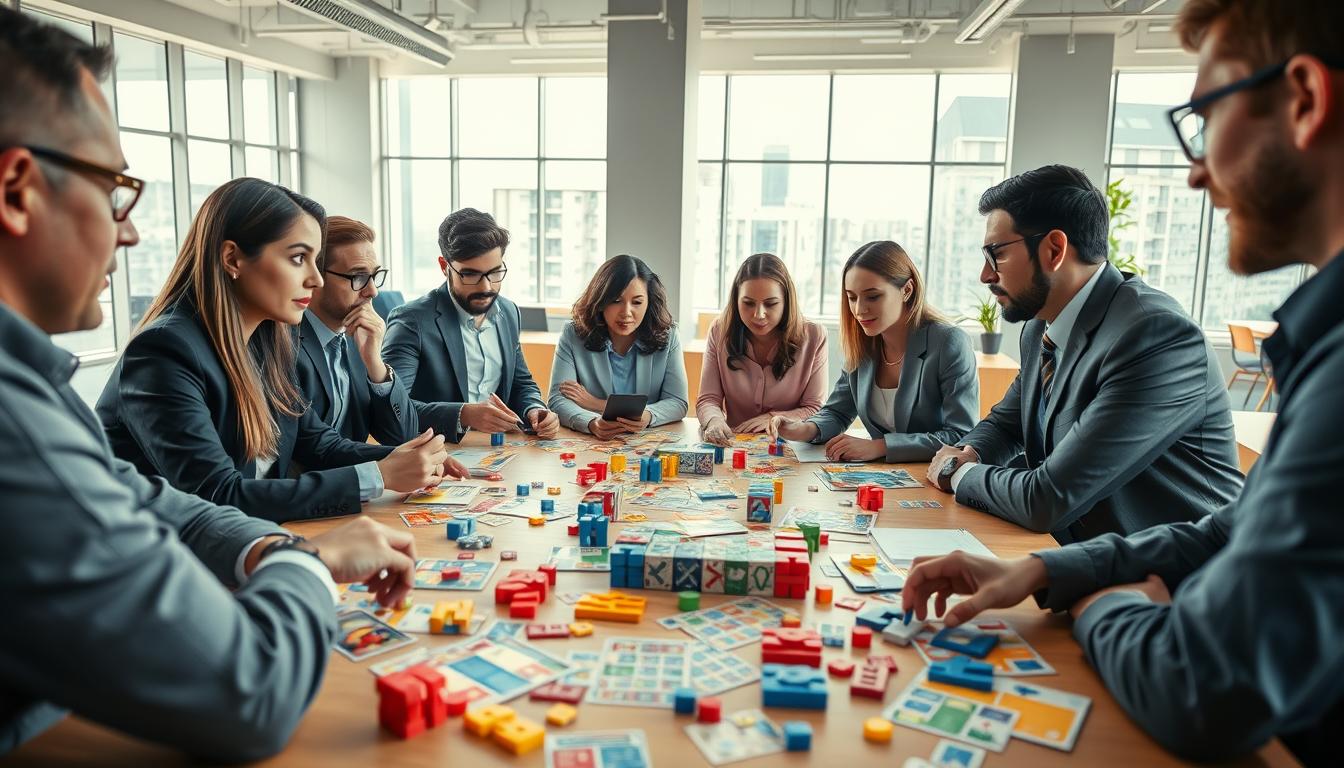Mental games to reinforce focus and cognitive discipline
Ever thought a simple game could boost focus and discipline? In today’s world, distractions are everywhere. Yet, mental games can help, especially for adults with mild attention issues. These games improve focus and sharpen cognitive skills, all while being fun.
Let’s explore how these exercises can boost your mental sharpness. They can change your daily life for the better.
The Importance of Mental Games for Focus
Mental games are key to better focus and brain function. They are like workouts for your brain, helping it stay sharp. Playing these games regularly boosts skills like memory, attention, and self-control.
As you play, the games get harder, pushing you to grow. This helps improve your focus and makes your brain more agile. Adding these games to your daily life can really help you concentrate better and stay mentally sharp.
Understanding Cognitive Discipline
Cognitive discipline is about managing your attention and thoughts well. It’s not just about staying focused. It also includes skills for handling daily challenges. Key parts are working memory, inhibitory control, and cognitive flexibility.
These parts help you stay focused, even when there are lots of distractions. To get better at cognitive discipline, you need to use strategies that improve these skills. For example, doing puzzles and games can make your attention sharper and self-regulation better.

Learning about cognitive discipline can help you grow personally. By improving your self-regulation, you can concentrate better and handle distractions more easily. So, building cognitive discipline is key for anyone wanting to improve their thinking skills in many areas of life.
Brain Games for Adults with Mild Attention Deficit
Brain games for adults are a great way to fight mild attention deficit. They help improve focus and memory through cognitive training. Knowing the different types of brain games helps pick the right ones for personal growth.
Types of Brain Games
There are many types of brain games to meet different needs. Here are some common ones:
- Memory Games: Help improve remembering and keeping information.
- Puzzles: Boost problem-solving and critical thinking.
- Concentration Games: Need you to pay close attention and process visuals.
- Interactive Activities: Improve teamwork and communication.
How They Work
Brain games make you think hard and solve problems. They create a fun, interactive space that keeps you focused. Playing regularly makes your brain stronger, helping with impulse control and thinking.
Engaging Activities to Improve Focus
Doing different activities to improve focus can really boost your brain power. Games and fun activities are great for keeping your mind sharp. Adding these to your daily life helps you grow mentally.
Exercise is key because it gets your blood flowing to your brain. This makes you think better. Arts and crafts let you be creative and focus. Talking to others also keeps your mind active and sharp.
Trying out various activities can bring unique benefits. Here are some fun and effective ones:
| Activity | Type | Benefits |
|---|---|---|
| Puzzles | Engaging brain activity | Improves problem-solving skills and attention to detail |
| Yoga | Exercise | Enhances mental clarity and reduces stress |
| Drawing | Arts and crafts | Encourages creativity and focus |
| Board Games | Structured game | Promotes strategic thinking and communication skills |
Adding these activities to your daily life can really help your focus. A balanced approach not only wakes up your mind but also makes life more fulfilling.
The Role of Meditation in Cognitive Enhancement
Meditation is becoming more popular as a way to boost brain power. It helps improve focus and attention. By practicing regularly, people learn to be more aware of their thoughts.
This awareness helps them stay focused and avoid distractions. Studies show that meditation can also protect against brain decline. It makes the brain stronger and improves memory and concentration.
Regular meditation can greatly enhance cognitive performance. It’s a powerful tool for better mental health and focus.
Visualization Techniques to Boost Concentration
Visualization techniques are key to improving concentration. They help by creating clear mental images. This makes it easier to organize thoughts and set priorities.
By picturing tasks and goals in your mind, you make them feel real. This is helpful for presentations or studying. It keeps information in mind and lowers stress. Visualizing success helps you stay focused on your goals.
Adding visualization to your daily life can greatly improve your thinking skills. Here are some ways to do it:
| Visualization Technique | Description | Benefits |
|---|---|---|
| Mind Mapping | A visual representation of thoughts and ideas. | Enhances organization and clarity. |
| Scenario Visualization | Picturing specific scenarios for practice. | Improves performance in real-life situations. |
| Guided Imagery | Using scripts to guide visualization. | Reduces stress and promotes calmness. |
| Vision Boards | Collaging images and affirmations. | Reinforces goals and motivates action. |
Using these visualization methods can really help improve your focus. They open up new ways to stay focused, leading to better work and thinking skills.
Board Games and Their Cognitive Benefits
Board games have grown from simple fun to powerful tools for brain training. They entertain and boost mental skills, offering many cognitive benefits. Players develop focus and mental discipline through strategy, calculation, and teamwork.
Classic Games to Enhance Focus
Classic games like chess and Go have proven their worth over time. They require players to think ahead, sharpening strategic thinking and memory. Playing these games helps build patience and concentration, making them great for improving cognitive skills.
Newer Board Games for Cognitive Training
Modern board games also focus on cognitive training. Games like Codenames and Pandemic challenge players to work together and solve problems fast. These games boost critical thinking, adaptability, and teamwork, adding to their cognitive benefits.
| Game Title | Type | Cognitive Benefits |
|---|---|---|
| Chess | Classic | Strategic thinking, memory enhancement |
| Go | Classic | Focus, patience, long-term planning |
| Codenames | Modern | Teamwork, critical thinking |
| Pandemic | Modern | Adaptability, collaborative problem solving |
Interactive Puzzles for Boosting Attention
Interactive puzzles are great for improving attention and problem-solving skills. Activities like jigsaw puzzles, crossword puzzles, and Sudoku are fun and good for your brain. They help you stay focused and improve your mental health.
Studies show that solving puzzles regularly keeps your mind sharp. It helps fight off the effects of aging on the brain. These puzzles are good for everyone, from young adults to the elderly. They make your brain work harder and improve your fine motor skills.
Video Games: A Double-Edged Sword
Video games have changed a lot. They are fun and can even help our brains. Some people think they’re just a waste of time. But, some games can really help us pay attention and stay focused.
It’s important to pick the right games to get these benefits. Action games are especially good. They make us quicker and better at watching things around us. This can help us in real life too.
Identifying Beneficial Video Games
Choosing the right games is key to getting better at thinking. Here are some types that can help:
- Action games: Improve quick reflexes and visual processing.
- Puzzle games: Boost problem-solving and thinking ahead.
- Simulation games: Teach planning and managing resources.
- Memory games: Help with remembering things and handling information.
But, it’s important not to play too much. Too much gaming can be bad. Playing games in moderation is better. This way, we can have fun and also get better at paying attention and staying focused.
Physical Exercises That Support Mental Focus
Regular physical exercises are key to better brain function. Activities like running and cycling boost brain health by improving blood flow. Yoga is also great, combining movement with mindfulness to support brain health.
Dancing is a fun way to stay active and improve brain connections. It releases endorphins, making us feel good and less stressed. This helps us stay focused on tasks.
| Type of Exercise | Benefits for Mental Focus |
|---|---|
| Aerobic Exercise | Increases blood flow to the brain, enhances memory, and improves concentration. |
| Yoga | Combines mindfulness with physical movement, aiding in relaxation and mental clarity. |
| Dancing | Encourages brain connectivity while being a fun way to stay active, improves mood and motivation. |
Adding physical exercises to your daily routine boosts focus and brain power. These activities not only help with focus but also improve overall brain health. Staying active is essential for better mental performance in work and life.
Mental Exercise through Social Activities
Doing mental exercises through social activities is a great way to improve your thinking skills. When you join in discussions, play trivia games, or work together in groups, you get to socialize and also boost your brain. Studies show that being social can slow down brain aging and make you better at paying attention and remembering things.
Group activities are a fun way to work on your brain in a lively setting. Playing team sports or board games together makes you think critically, solve problems, and talk better. These activities make your brain more flexible and strong.
| Type of Activity | Cognitive Benefits | Social Connections |
|---|---|---|
| Trivia Games | Enhances recall and critical thinking | Fosters teamwork and communication |
| Discussion Groups | Stimulates idea exchange and perspective-taking | Builds relationships and camaraderie |
| Team Sports | Boosts strategic thinking and coordination | Encourages collaboration and social bonding |
Adding mental exercises to your social life makes your brain stronger and helps you feel part of a community. Being around others can make your social life richer and also keep your brain sharp and active.
Engaging with New Hobbies for Cognitive Growth
Trying new hobbies can really help your brain grow. Activities like painting, crafting, or playing music keep your mind sharp. They make you think creatively and learn new things.
These hobbies let you express yourself in new ways. They push your brain to new limits while you have fun.
Art and Craft as Cognitive Tools
Art and craft do more than just entertain. They work both sides of the brain, improving coordination and problem-solving. Doing hands-on projects helps you focus better.
For example, knitting or sculpting make you think on your feet. They challenge your brain to come up with new ideas.
Studies show that adding these hobbies to your life boosts your brain and mood. Completing projects and exploring your artistic side can make you happier. So, art and craft not only grow your skills but also make you feel better.
Creating a Routine for Mental Discipline
Creating a routine for mental discipline is key to a productive mindset. Adding cognitive exercises and focus activities to your day boosts concentration and mental sharpness. Using organizational strategies helps manage time well, keeping your mental health goals in check.
A good routine builds cognitive consistency. It makes your brain better at staying focused. Make sure to include time for relaxation, exercise, and brain workouts. Good sleep and nutrition are also crucial for top brain performance.
- Dedicated time for brain exercises.
- Engagement in hobbies that demand creativity.
- Adherence to a consistent sleep schedule.
- Incorporation of mindfulness practices.
This approach strengthens mental resilience and sharpens focus. A structured plan boosts cognitive abilities, leading to better attention and productivity.
Practicing Mindfulness to Strengthen Attention
Mindfulness can greatly improve your ability to focus. It helps you stay present and avoid distractions. This leads to better productivity.
Techniques like focused breathing and body scans help you become more aware. They teach you to notice your thoughts and surroundings better.
Regular mindfulness practice strengthens your attention and self-control. It lets you catch when your mind drifts and bring it back. This makes your mind more flexible and improves your focus over time.
You don’t need a lot of time to practice mindfulness. Even short sessions can be very beneficial. Making mindfulness a part of your daily routine can greatly improve your focus in all areas of life.
Conclusion
Mental games and activities are key to improving focus and discipline. They help adults with mild attention issues a lot. Games, exercises, socializing, and mindfulness are all part of the solution.
These activities make the mind sharper and more agile. They help people who want to get better at focusing. It’s a fun way to train your brain and boost productivity.
By sticking to these strategies, you can see big improvements in your thinking and work. This balanced approach is the best way to grow and succeed.
Playing mental games and doing different activities helps a lot. It’s not just for quick focus boosts. It builds lasting discipline in your mind. So, try out different methods and find what works best for you. Start your journey to clearer thinking today.
FAQ
What are mental games and how do they improve focus?
Mental games are activities that make your brain work harder. They help improve skills like paying attention, remembering things, and controlling impulses. Playing these games often can make adults focus better and improve their brain skills.
Can brain games benefit adults with attention deficits?
Yes, brain games are made to help people with attention problems. They make your brain better at remembering things, solving problems, and thinking clearly. They come in different levels to challenge your brain.
What types of activities can help improve focus?
To get better at focusing, try mental games, exercise, arts, talking to people, and mindfulness. Doing different things helps tackle focus problems from many angles.
How does meditation contribute to cognitive enhancement?
Meditation helps you stay focused and ignore distractions. It makes your brain work better, helps you remember things, and makes you think more clearly.
What is cognitive discipline and why is it important?
Cognitive discipline means you can control your attention and thoughts. It’s key for staying focused and managing feelings. It helps you deal with daily challenges, especially if you have trouble paying attention.
Are there specific board games that enhance cognitive skills?
Yes, games like chess and new strategic games can improve your focus, problem-solving, and memory. They’re fun and also good for training your brain.
How do interactive puzzles improve attention?
Puzzles like jigsaw puzzles, crosswords, and Sudoku need you to concentrate and work your brain. Doing them often can make your attention better and keep your brain sharp.
Can video games have a positive impact on focus?
Some video games, especially action games, can make your visual attention and speed better. But, choose games wisely to get the most benefits without getting distracted.
How does physical exercise support cognitive function?
Exercise like running, yoga, and dancing is linked to better brain function and attention. It keeps your brain healthy, lowers stress, and makes you think clearer, all helping you focus better.
What role do social activities play in cognitive training?
Talking and playing games with others can make your brain work better and improve attention. Regular socializing helps keep your brain sharp and builds mental strength.
How can starting new hobbies improve cognitive growth?
Hobbies like painting, knitting, or playing music work different parts of your brain. They boost creativity and patience, improving your mental and emotional health and making your brain more resilient.
What is the significance of establishing a routine for mental discipline?
A good routine helps you focus by creating a space for concentration. Setting aside time for brain exercises, fun activities, and relaxation can greatly improve your attention and brain power.
How does mindfulness help improve attention?
Mindfulness practices, like focused breathing and body scans, help you stay present and focused. They improve self-control and reduce distractions, leading to better sustained attention.














